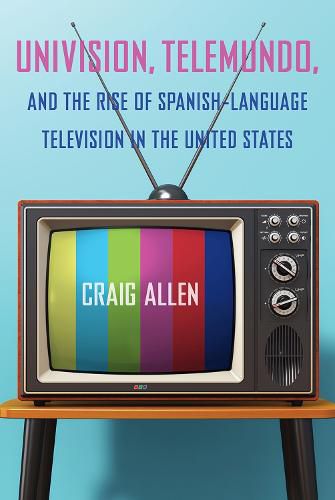Readings Newsletter
Become a Readings Member to make your shopping experience even easier.
Sign in or sign up for free!
You’re not far away from qualifying for FREE standard shipping within Australia
You’ve qualified for FREE standard shipping within Australia
The cart is loading…






This title is printed to order. This book may have been self-published. If so, we cannot guarantee the quality of the content. In the main most books will have gone through the editing process however some may not. We therefore suggest that you be aware of this before ordering this book. If in doubt check either the author or publisher’s details as we are unable to accept any returns unless they are faulty. Please contact us if you have any questions.
In the most comprehensive history of Spanish-language television in the United States to date, Craig Allen traces the development of two prominent yet little-studied powerhouses, Univision and Telemundo. Allen tells the inside story of how these networks fought enormous odds to rise as giants of mass communication within an English-dominated society.
The book begins in San Antonio, Texas, in 1961 with the launch of the first Spanish-language station in the country. From it rose the Spanish International Network (SIN), which would later become Univision. Conceived by Mexican broadcasting mogul Emilio Azcarraga Vidaurreta and created by unsung American television pioneers, Unvision grew to provide a vast amount of international programming, including popular telenovelas, and was the first U.S. network delivered by satellite. After Telemundo was founded in the 1980s by Saul Steinberg and Harry Silverman, the two networks battled over audiences and saw dramatic changes in leadership. Today, Univision and Telemundo are multibillion-dollar television providers that equal ABC, CBS, NBC, and Fox in scale and stature. While Univision remains a beacon of U.S. television’s internationalization, Telemundo-owned by NBC-is a worldwide leader in producing Spanish-language programs.
Using archival sources and original interviews to reconstruct power struggles and behind-the-scenes intrigue, Allen uses this exciting narrative to question monolingual and Anglo-centered versions of U.S. television history. He demonstrates the endurance, innovation, and popularity of Spanish-language television, arguing that its story is essential to understanding the Latinx history of contemporary America.
$9.00 standard shipping within Australia
FREE standard shipping within Australia for orders over $100.00
Express & International shipping calculated at checkout
This title is printed to order. This book may have been self-published. If so, we cannot guarantee the quality of the content. In the main most books will have gone through the editing process however some may not. We therefore suggest that you be aware of this before ordering this book. If in doubt check either the author or publisher’s details as we are unable to accept any returns unless they are faulty. Please contact us if you have any questions.
In the most comprehensive history of Spanish-language television in the United States to date, Craig Allen traces the development of two prominent yet little-studied powerhouses, Univision and Telemundo. Allen tells the inside story of how these networks fought enormous odds to rise as giants of mass communication within an English-dominated society.
The book begins in San Antonio, Texas, in 1961 with the launch of the first Spanish-language station in the country. From it rose the Spanish International Network (SIN), which would later become Univision. Conceived by Mexican broadcasting mogul Emilio Azcarraga Vidaurreta and created by unsung American television pioneers, Unvision grew to provide a vast amount of international programming, including popular telenovelas, and was the first U.S. network delivered by satellite. After Telemundo was founded in the 1980s by Saul Steinberg and Harry Silverman, the two networks battled over audiences and saw dramatic changes in leadership. Today, Univision and Telemundo are multibillion-dollar television providers that equal ABC, CBS, NBC, and Fox in scale and stature. While Univision remains a beacon of U.S. television’s internationalization, Telemundo-owned by NBC-is a worldwide leader in producing Spanish-language programs.
Using archival sources and original interviews to reconstruct power struggles and behind-the-scenes intrigue, Allen uses this exciting narrative to question monolingual and Anglo-centered versions of U.S. television history. He demonstrates the endurance, innovation, and popularity of Spanish-language television, arguing that its story is essential to understanding the Latinx history of contemporary America.